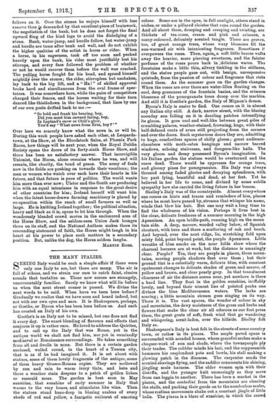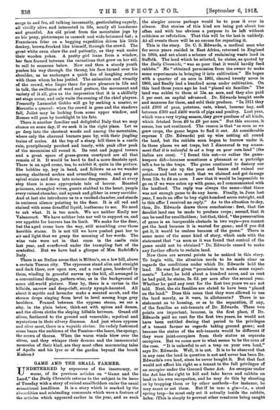THE MANY ITALIES.
SEEING Italy would be such a simple affair if there were only one Italy to see, but there are many. The air is full of echoes, and we strain our ears to catch faint, elusive sounds that tantalize us.- These new scenes are strangely, unaccountably familiar. Surely we know what will lie- before us when the next- street corner is passed. We divine the next words to be said. When have we' been here before ? Gradually we realize that we have seen and heard indeed, but not with our own eyes and ears. It is Shakespeare, perhaps, or Goethe, or Byron who has been here before us. And each has created an Italy of his own.
Goethe's is an Italy not to be missed, but one does not find it every day. The exact blending of flavours and effects that conjures it up is rather rare_ He loved to address the Quirites, and to call up the Italy- that was Rome, yet in the antique world we shall not find him, nor yet in umnixedly mediaeval or Renaissance surroundings_ He takes something from all and dwells in ncue. But there is a certain garden enclosed, walled round, in the heart of a. Tuscan city, that is as if he had imagined it._ It is set about with statues, some of them lovely fragments of the antique, some of them heavy Graeco-Roman copies. They are mellowed by sun and rain to warm ivory tints,. and here and there a weather stain deepens to a patch of golden lichen or emerald moss. The garden. is- best seen in May sunshine, that sunshine of early. summer in Italy that warms to the very bones, and stimulates like- wine. Then. the statues stand knee-deep in blazing azaleas of every shade of red and yellow, a fantastic outburst of amazing
colour. Some are in the open, in full sunlight, others stand in niches, or under a pillared cloister that runs round the garden.
And all about them, drooping and creeping and twisting, are thickets of tea-roses, cream and pink and crimson, a many-coloured, delicately scented tangle. There are groves, too, of great orange trees, whose waxy blossoms fill the sun-warmed air with intoxicating fragrance. Sometimes overpowers the roses. Then, again,sa soft little breeze wafts away the heavier, more piercing sweetness, and the fainter perfume of the roses pours back in :delicious waves. The
fountains make a little thin, silvery tinkling in the stillness, and the statue people gaze out, with benign, unresponsive quietude, from the passion of colour and fragrance that riots round them. As the summer goes on the garden changes. When the roses are over there are water-lilies floating on the cool, deep greenness of the fountain basins, and the crimson blossoms of the pomegranate trees droop over the marbles. And still it is Goethe's garden, the Italy of Mignon's dream.
Byron's Italy is easier to find. One comes on it in almost any Italian city still. A dark, narrow street, with the blazing noonday sun falling on it in dazzling patches intensifying its gloom. It goes cool and well-like between great, piles of crumbling palaces, weather-stained, frowning, huge, with their half-defaced coats of arms still projecting from the corners and over the doors. Such mysterious doors they are, admitting to huge, comfortless spaces of chilly gloom; great audience- chambers with moth-eaten hangings and narrow barred windows, echoing staircases, and dungeon-like halls. The very gloom and decay possessed Byron's imagination. In Ms Italian garden the statues would be overturned and the roses dead. There would be cypresses for orange trees, and gloomy pines for pomegranates. His Italy was always throned among faded glories and decaying splendours, with her past lying, beautiful and dead, at her feet. Yet he believed in her life- to come, and divined by some subtle sympathy how she carried the living future in her bosom.
Shelley's Italy was of the countryside. Almost everywhere one comes on hints and traces and reminders of him, places where he must have-passed by, streams that whisper his name, winds that blew his hair. But one may wait a long time to find the wholeness of his vision. Perhaps it lives best in the clear, delicate freshness of a summer morning in the high Apennines. An open bridle-path, running high on the moun
tain side. A deep, narrow, wooded valley below, of Spanish chestnut, with here and there a scattering of oak and beech.
And beyond, over the next ridge, lie, stretching fold upon misty fold, point beyond point, the purple Apennines. Little wreaths of blue smoke on the near folds show where the charcoal burners are at work, but the distance is amazingly clear. Purple ? Yes, they are purple in places, these moun- tains, moving purple shadows fleet over them ; but their ground tint is a celestially warm, delicate blue, with constant opalescent changes to delicate shades of green and mauve, of yellow and brown, and clear pearly grey. In that translucent clearness of air the distance seems near, yet nowhere is there a hard line.- They float in the golden sunshine, ineffably lovely, and beyond their utmost line of pointed peaks one divines the blue Mediterranean waters. The larks are soaring ; a little mountain stream goes singing on its way. There- it is. The vast spaces, the wonder of colour in sky and mountains, the dewy moistness of the grass and herbs and flowers that make the clear air all odorous as our feet press them, the great gusts of soft, fresh wind that go wandering and whispering, scent-laden, over the hillside. Shelley felt Italy so.
Shakespeare's Italy is best felt in the streets of some country town,. or rather in its piazza. The ample paved space is surrounded with arcaded houses, whose graceful arches make a chequer-work of sun and shade, where the townspeople ply their trades; The cobbler minds his last, and the coppersmith hammers his resplendent pots and bowls, his stall making a glowing patch in the dimness. The carpenter sends the scented shavings flying, and the saddler ornaments his shining, jingling mule- harness. The older women spin with their distaffs, and the younger knit unceasingly as they move from one loggia to another. There has been a market in the piazza, and the cantadini from the mountains are clearing the stalls, and packing their goods on to the numberless mules, whose restless movements shake out a constant jingle of little bells. The piazza is a blaze of sunshine, in which the crowd
surge to and fro, all talking incessantly, gesticulating eagerly, all vividly alive and interested in life, nearly all handsome and graceful. An old priest from the mountains jogs by on his pony, picturesque in cassock and wide-brimmed hat ; a Franciscan friar on a begging expedition drives his little donkey, brown-frocked like himself, through the crowd. The great white oxen chew the cud patiently, as they wait under their wooden yokes. A pretty girl leans from a window, her face framed between the carnations that grow on her sill, to call to someone below. Now and then a sturdy youth pushes his way through the throng, his face turned over his shoulder, as he exchanges a quick fire of laughing retorts with those whom he has jostled. The animation and vivacity of the crowd, who linger there for pure pleasure in life and in talk, the swiftness of word and gesture, the movement and variety of it all, give us the impression that it is a skilfully set stage scene, and only waits the coming of the chief players. Presently Launcelot Gobbo will go by seeking a master, or Mercutio a quarrel: when the crowd is gone and the shadows fall, Juliet may be looking from some upper window, and Romeo will pass by torchlight to his fate.
There is another familiar and -delightful Italy that we may chance on some day, if we seek it in the right place. Let us go deep into the chestnut woods and among the mountains, where only the charcoal burners pass by, with their jingling trains of mules. At the top of a sharp hill there is a castle ruin, precipitously perched and lonely, with peak after peak of the mountains all round it. Its rent and jagged towers and a great space of grass-grown courtyard are all that remain of it. It would be bard to find a more desolate spot. There is an aged crone, too, to exhibit it, quite in the picture. She hobbles up, key in hand, and follows us as we wander among shattered arches and crumbling vaults, and peep at spiral stairs and down into noisome dungeons. And at every step there is some appropriate tale of horror. Roasted prisoners, strangled wives, guests stabbed to the heart, people every ruined chamber, and squeak and gibber in every corridor. And at last she introduces us to a vaulted chamber, and stands in ominous silence pointing to the floor. It is all red and stained with some dreadful liquid, loathsome to see. No need to ask what. It is too much. We are neither Emily nor Yalancourt. We have neither bate nor veil to support us, and our appetite for horrors has its limit. We make for the door, but the aged crone bars the way, still mumbling over those horrible stains. It is not till we have pushed past her to air and light that we grasp the meaning of her words. The wine vats were set in that room in the castle ruin last year, and overflowed under the trampling feet of the contadini. But we have had a glimpse of Mrs. Radcliffe's Italy.
There is an Italian scene that is Milton's, on a low hill, above a certain Tuscan city. The cypresses stand slim and straight and dark there, row upon row, and a road goes, bordered by them, winding in graceful curves np the hill, all arranged in a conventional design, pattern-wise, as in the background of some old-world picture. Near by, there is a ravine in the hillside, narrow and deep-cleft, surely nymph-haunted. All about it myrtle and lavender make a scented scrub, and the stream drops singing from level to level among huge grey boulders. Framed between the cypress stems, we see a city, in the plain below, thick-set with spires and domes, and the olives clothe the sloping hillside between. Grand old olives, feathered to the ground and venerable ; mystical and mysterious in their silvery dimness. And just where cypress and olive meet, there is a wayside shrine. Its rudely fashioned cross bears the emblems of the Passion—the lance, the sponge, the crown of thorns. When the warm winds blow over the olives, and they whisper their dreams and the immemorial memories of their kind, are they most often murmuring tales of Apollo and his lyre or of the garden beyond the brook liedron ?







































 Previous page
Previous page